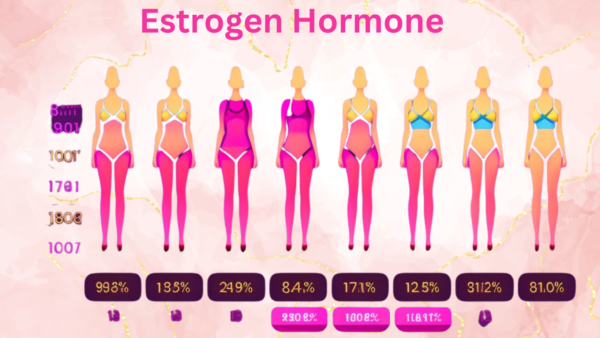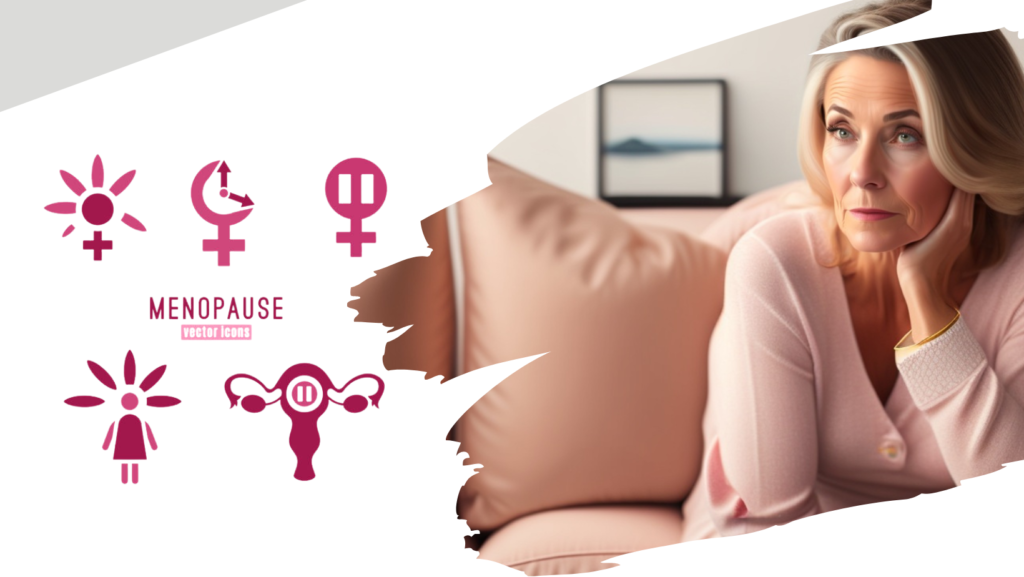Hi Friends, Welcome🙏to SambhogSutra.com – A Symbiosis of Sexual Wellness & Responsible Nutrition. Today’s topic is dedicated to Sex Drive & Menopause: The Role of Nutrition in Female Sexual Wellness.

Menopause typically occurs in women between the ages of 45 and 55, and it signals the end of the fertile phase of a woman’s life. According to the World Health Organization, there are approximately 1.2 billion women worldwide 🌏 over the age of 50, and it is estimated that by 2030, this number will rise to 1.1 billion. It’s important to note that every woman will experience menopause, and therefore, the impact of menopause on sexual drive and wellness can affect a significant number of women globally. A study published in the journal Menopause found that 40-55% of women experience low sexual desire during menopause.
In India 🇮🇳, it is estimated that there are about 65 million women above the age of 45, who are either going through menopause or have already reached this stage. Studies have found that the average age of menopause in India is approximately 46.2 years, slightly lower than the global average. A study published in the journal Maturitas found that 34% of women in India experience low sexual desire during menopause.
A significant shift in societal perspective is occurring with increased openness and understanding about the sexual health issues women face during menopause. A rising trend is the inclusion of menopause-related concerns in mainstream discussions about women’s health and sexual wellness. This shift is empowering women to openly discuss their menopause-related sexual health issues and seek help, leading to improved well-being and quality of life.
Furthermore, the role of nutrition in managing menopause symptoms, including sex drive, is receiving greater recognition. The interaction between diet and menopausal symptoms has been a recent focus in nutritional research. For example, the Mediterranean diet, rich in fresh fruits, vegetables, whole grains, and healthy fats, has been associated with reduced menopausal symptoms, including decreased libido. This increased interest in the dietary management of menopause symptoms highlights the potential benefits of nutrition in supporting sexual wellness during menopause.
By understanding and addressing menopausal sexual health and its nutritional implications, we can contribute to the broader mission of promoting sexual wellness among women of all ages. Combining a balanced diet with other lifestyle modifications like regular exercise, stress management, and open communication about sexual health can pave the way for a healthier, more satisfying menopausal journey. During menopause, hormonal changes can impact sex drive, leading to a decrease in libido for many women.
Here are 5 Strategies may helpful to overcome the challenges & improvise Female Sexual Wellness: 🥰

- Dietary Changes 🥗: Adapting your diet to include foods rich in phyto-estrogens and Omega-3 fatty acids, like flaxseeds, soy products, and fatty fish, can help manage hormonal fluctuations during menopause. These nutritional changes can potentially support overall sexual function.
- Mindfulness Practices 🧘♀️: Engaging in mindfulness practices such as yoga, meditation, and deep breathing exercises can help manage stress and anxiety – common symptoms during menopause that can negatively impact libido.
- Hormone Replacement Therapy (HRT) 💉: For some women, HRT can help manage menopause symptoms, including low libido. It’s important to discuss this option with a healthcare provider as it comes with potential risks and benefits.
- Open Communication 🗣️: Fostering open dialogue about sexual health with partners, peers, and health professionals can lead to better understanding, improved intimacy, and more personalized care.
- Nutritional Supplements 🌿: Specific nutritional supplements like Ashwagandha, Velvet Bean, and Vitamin E can support hormonal balance and overall well-being, potentially enhancing libido during menopause.
Here are 5 interesting Myths & Facts in relation to menopause & Female Sexual Wellness: 🥰

Myth: Decreased sex drive is inevitable during menopause.
Fact: While hormonal changes during menopause can influence libido, it is not the same for all women. Some women even report an increase in sexual desire after menopause.
Myth: Menopause means the end of a woman’s sexual life.
Fact: Menopause is a natural transition in a woman’s life and does not signify the end of sexual activity or enjoyment. With appropriate management strategies, many women can continue to have a satisfying sex life after menopause.
Myth: Hormone replacement therapy is the only solution for low libido during menopause.
Fact: While HRT can be helpful for some women, there are several other strategies, like lifestyle modifications and nutritional changes, that can effectively manage low sex drive during menopause.
Myth: All women experience menopause at the same age.
Fact: The age at which women reach menopause can vary widely, usually occurring between the ages of 45-55. Factors such as genetics, lifestyle, and overall health can influence the timing of menopause.
Myth: Menopause only causes physical changes.
Fact: Menopause can lead to both physical and psychological changes. Fluctuating hormone levels can impact mood, sleep, cognition, and sexual function. Understanding these changes can help in effectively managing menopause and maintaining sexual wellness
Here are 5 Phyto Nutrients may helpful to improvise Female Sexual Wellness during Menopause: 🥰

- Ashwagandha 🌿: Known as an adaptogen, Ashwagandha is praised for its stress-relieving properties. It has been found to improve sexual function and reduce symptoms associated with menopause, including decreased libido.
- Velvet Bean 🌱: Also known as Mucuna pruriens, this plant contains L-Dopa, a precursor to dopamine, the ‘feel good’ neurotransmitter. By promoting dopamine production, velvet bean can enhance mood and potentially support sex drive during menopause.
- Cordyceps Militaris 🍄: This type of medicinal mushroom is known to boost libido and improve sexual function. It’s also praised for its energy-boosting and anti-aging properties, both of which could contribute to overall wellness and vitality during menopause.
- Isoflavones 🌰: These plant-based compounds mimic the effects of estrogen in the body. Found in high quantities in foods like soybeans, isoflavones may help alleviate some of the hormonal imbalances associated with menopause and support a healthy sex drive.
- Vitamin E 🥜: This essential nutrient is an antioxidant that promotes cellular health. It may alleviate some of the symptoms associated with hormonal changes during menopause, including vaginal dryness and hot flashes, thereby supporting libido.
Here are 5 Tenchniques may also helpful to counter the challenges & improvise Female Sexual Wellness: 🥰

- Adequate Rest : Ensuring you get sufficient sleep is crucial. Healthy sleep routines can help manage hormonal balance, improve mood, and support overall health, which can all contribute to a healthy sex drive.
- Stress Management Techniques : Adopting stress management techniques like deep breathing exercises, yoga, and meditation can improve overall well-being and potentially boost sex drive.
- Regular Health Screenings : Regular check-ups can help detect and manage any health issues early, offering an opportunity to discuss concerns related to menopause or sexual health with a healthcare provider.
- Pelvic Floor Exercises : Exercises like Kegels can strengthen the pelvic floor muscles, enhancing sexual function and satisfaction.
- Sexual Counseling or Therapy : If emotional or psychological factors impact your sex drive, counseling or therapy can help. Professionals in this field can provide strategies to improve sexual health and enhance intimacy.
Disclaimer: The ingredients mentioned in this blog post may have some health benefits, therefore cannot be a substitute for professional medical advice. Consult with your doctor before starting any supplementation program, especially if you have any chronic health conditions. The information shared in this blog post is collected from the best online resources for educational and awareness purposes only. It should not be used to diagnose or treat any medical conditions.
SambhogSutra.com firmly believes to respect each other’s boundaries, freedom, and preferences in all romantic relationships. We always try to be honest and transparent through our shared content hence it is not meant to mislead or hurt anyone’s feelings.




Pingback: Female Sexual Wellness: Nutrition Enhances Pleasure